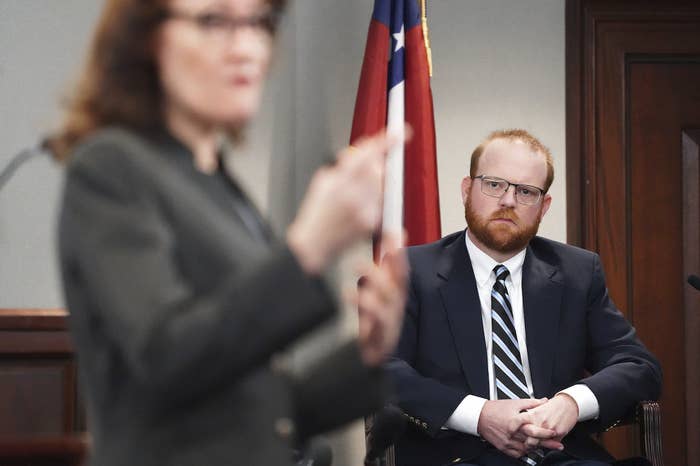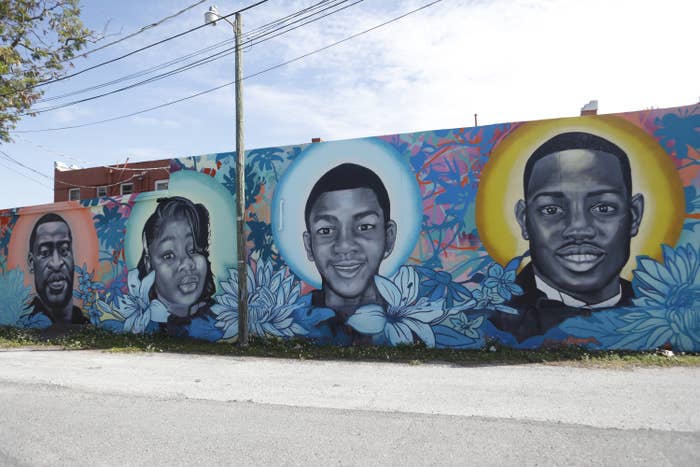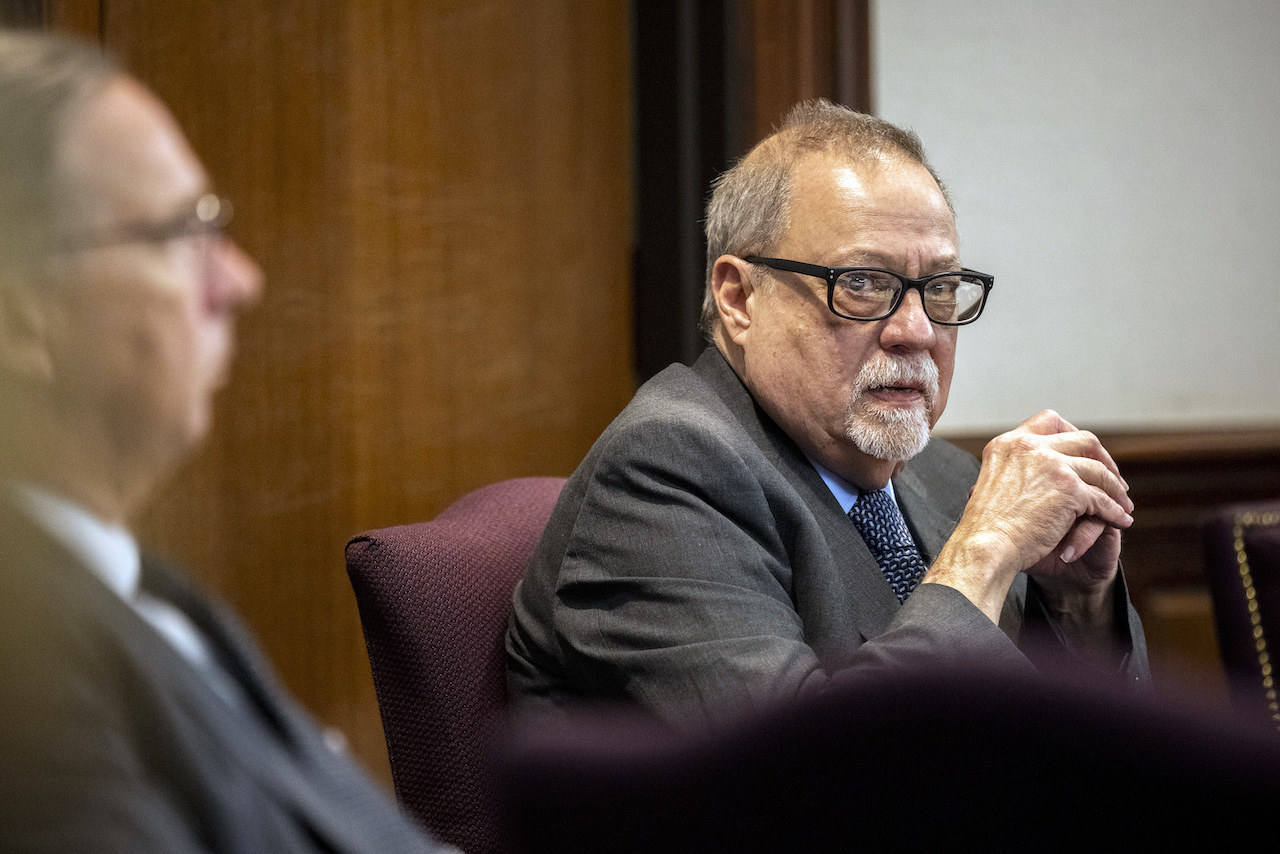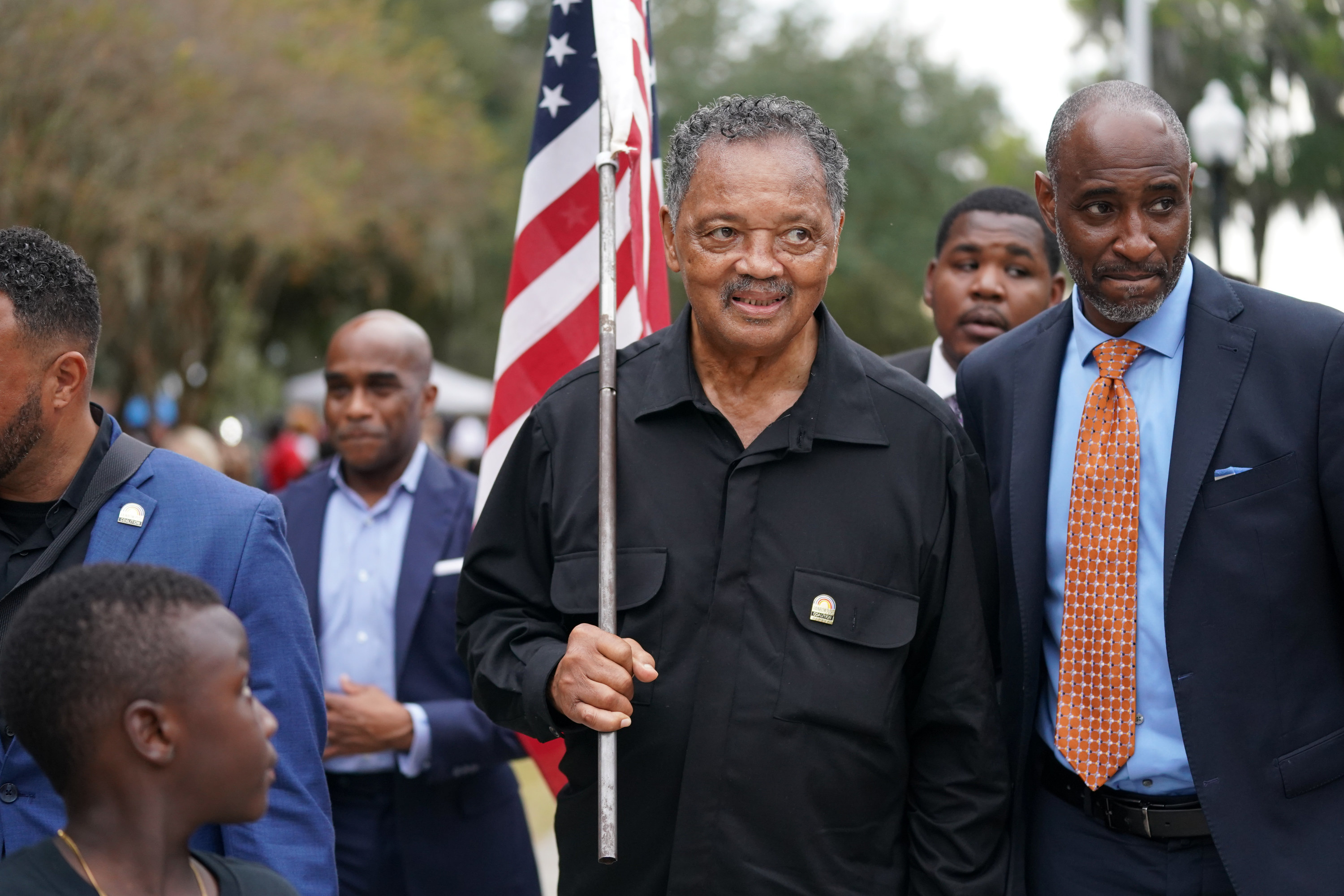
The three white men who fatally shot Ahmaud Arbery after chasing down the 25-year-old Black man as he was running along a two-lane Georgia road were found guilty of felony murder on Wednesday.
Arbery was killed in February 2020, just months before the nation experienced a reckoning on police violence against Black men and women, and his death prompted protest of another aspect of racial inequality in the justice system. Though the unarmed man was gunned down in broad daylight, the men who admitted they had chased him in their trucks and killed him were not immediately arrested.
It wasn’t until video of the shooting became public, drawing sharp questions about how local authorities handled the investigation that the three men were charged with murder.

Race and racism remained a looming presence in the case from the investigation's sputtering beginnings to the selection of the mostly white jury that would determine its outcome. Yet, for much of the trial, the judge, prosecutors, and defense attorneys attempted — and often failed — to skirt the issue.
But in her closing statement, prosecutor Linda Dunikoski tried to drive home to jurors that at the core of the defendants’ actions was their decision to stop Arbery because he was a Black man in their neighborhood.
"All three of these defendants made assumptions about what was going on that day, and they made their decision to attack Ahmaud Arbery in their driveways because he was a Black man running down the street," Dunikoski said. "They shot and killed him, not because he was a threat to them, but because he wouldn't stop and talk to them. And they were going to make him absolutely stop."
Travis McMichael, who pulled the trigger and shot Arbery during the violent confrontation, was convicted of all nine counts levied against him by prosecutors, including one count of malice murder, four counts of felony murder, two counts of aggravated assault, one count of false imprisonment of Arbery, and one count of criminal attempt to commit a felony.
His father, Greg McMichael, was also convicted of four counts of felony murder, two counts of aggravated assault, one count of false imprisonment, and one count of criminal attempt to commit a felony. He was cleared of a single count of malice murder.
Their neighbor, William Bryan, was convicted of three counts of felony murder, one count of aggravated assault, one count of false imprisonment, and a single count of a criminal attempt to commit a felony. He was found not guilty of a count of malice murder, one count of felony murder, and one count of aggravated assault.
All three now face a sentence of life in prison.
As the judge read the verdict in the courtroom, one person yelled out after hearing Travis McMichael had been convicted, prompting the judge to stop the proceedings and ordering that person to be escorted out. CNN identified that person as Arbery's father, Marcus Arbery.
Prosecutors suggested Ahmaud Arbery was racially profiled while jogging, prompting the McMichaels to chase after him. But the jury never heard some evidence that could have shown racial bias: Prosecutors did not present old texts and social media posts by Travis McMichael, and the judge also barred the use of an image that showed the front of the McMichaels’ pickup, which had a vanity plate featuring Georgia's former state flag bearing the Confederate battle symbol. The jury also didn’t hear an allegation that Travis McMichael called Arbery the n-word after shooting him. Federal hate crimes charges are still pending against the three men.
In the state trial, prosecutors focused on arguing that the McMichaels and codefendant Bryan threatened and attacked an unarmed Arbery. Defense attorneys argued the three men were concerned about burglaries in their neighborhood and were attempting to make a citizen's arrest of Arbery.
"If this was a case about trying to murder a Black jogger, if this was really a case about that, Travis would not have reacted the ways he reacted," said defense attorney Jason Sheffield, pointing out that Travis McMichael had not reached for his gun when he first encountered Arbery.
Just a week ago, Kyle Rittenhouse was acquitted of murder charges over his shooting of protesters in Kenosha, Wisconsin, killing two of them. Rittenhouse had traveled to the scene of violent protests armed, yet said on the stand he was only there to protect property from rioters. He was acquitted after his attorneys argued he had fired in self-defense.
Rittenhouse has since been lionized by right-wing figures as a symbol of vigilantism and self-defense. Advocates for self-defense laws took his acquittal as a win, but in Georgia, the jury would rule differently.
In the McMichaels and Bryan case, prosecutor Linda Dunikoski rebutted the self-defense argument, saying the defendants couldn't make that claim legally if they were the initial aggressors, if they were committing a felony in the process, and if they were provoking someone.
“You are allowed to defend yourself,” defense attorney Sheffield argued. “You are allowed to use force that is likely to cause death or serious bodily injury if you believe it’s necessary. At that moment, Travis believed it was necessary. This is a law that is for a person in Travis’s situation.”
The defendants defense was based on Georgia's old law on citizen's arrest, which allowed people to take someone into custody if a crime had occurred "within his immediate knowledge."
A year after Arbery's death, Georgia Gov. Brian Kemp signed a bill making significant changes to the law, replacing the vague language to specific instances, such as people who witness shoplifters or people who try to skip on paying a restaurant bill. Kemp also signed the state's first hate crimes law. Both laws were passed after legislators argued Arbery's death showed the need for them.
"Ahmaud Arbery was the victim of vigilantism that has no place in Georgia," Kemp said in a statement on Wednesday. "As legal efforts continue to hold accountable all who may be responsible, we hope the Arbery family, the Brunswick community, our state, and those around the nation who have been following his case can now move forward down a path of healing and reconciliation."

Both sides agreed that the McMichaels spotted Arbery running in their neighborhood, then armed themselves and got into their pickup truck to chase him. Bryan, another neighbor, followed in another truck and filmed the chase.
Bryan’s video shows the McMichaels’ truck stopped on the side of the road as Arbery tries to run past it. A gunshot can be heard, then Arbery and Travis McMichael can be seen in close quarters. Taking the witness stand in his defense, McMichael said he was “under the impression” that Arbery could pose a threat because he was running toward him. He told the jury that Arbery grabbed his shotgun, but then admitted under questioning by prosecutors that he initially told police he was not sure whether Arbery had in fact grabbed the gun.
McMichael testified he shot Arbery even though Arbery never showed a weapon, never spoke to him, and never threatened him.
Prosecutors argued the three men tried to attack Arbery from the outset and had no right to make a citizen's arrest because they had not witnessed Arbery committing any crime.
Meanwhile, defense attorneys argued it was Arbery's decision not to stop when the McMichaels told him to that ultimately led to his death.
"[Arbery] died because for whatever inexplicable, illogical reason, instead of staying where he was, whatever overwhelming reason he had to avoid being captured that day and arrested by police he chose to fight," defense attorney Laura Hogue said in closing arguments. Running in Travis McMichael's direction, she said, was "leaving [McMicheal] with no other alternative but to be placed in a position of killing another human being."
In their case, defense attorneys spent much of their time arguing that previous incidents of theft and burglary in the neighborhood played a role in the defendants' decision to go after Arbery.
Sheffield said the previous incidents had left his client on edge, and he pointed out that surveillance video from a neighboring home that was under construction had shown Arbery wandering the area in the past. McMichael had seen the video and identified Arbery from it as a suspected burglar, Sheffield said, even though the video doesn't show Arbery taking anything from the property.
Meanwhile, Kevin Gough, an attorney representing Bryan, tried to distance his client from the McMichaels, arguing that unlike them, Bryan didn’t take a weapon, had no idea the father and son had armed themselves, and that he provided video and testimony to police that made up much of the prosecution’s case.
Gough also tried to cast Arbery in a suspicious light, however, arguing that Arbery didn’t reach out to any of the neighbors for help while he was being chased down by the McMichaels.
“Maybe that’s because Mr. Arbery doesn’t want help,” he told jurors.
Although Arbery was found with no weapons when he was killed, defense attorneys looked to paint him as the aggressor.
Hogue, who represented Greg McMichael, referred to Arbery as a "recurring nighttime intruder" to the property, adding that before his death, he was "acting erratically and making terrible illogical choices" because Arbery refused to stop at the McMichaels’ orders.
She also tried to cast doubt on the prosecution's argument that Arbery had been out for a jog, making an inexplicable reference to Arbery's toenails.
"Turning Ahmaud Arbery into a victim after the choices that he made does not reflect the reality of what brought Ahmaud Arbery to Satilla Shores in his khaki shorts, with no socks to cover his long, dirty toenails," she said.

As the judge read the jury's verdict Wednesday afternoon, Arbery's mother sat in the back of the courtroom, wearing a face mask, nodding her head at the guilty verdicts, and pumping her arms at her side with closed fists.
Ahmaud Arbery's mother Wanda Cooper-Jones reacts to the guilty verdicts.
Outside, she thanked the crowd for their support and the prosecutors for a verdict that, she admitted, she didn't think would come.
"I never thought this day would come, but God is good," she told a crowd of supporters. "(Ahmaud) will now rest in peace."
Ben Crump, an attorney representing the Arbery family, said the verdict will bring the family some peace.
"This case, by all accounts, should have been opened and closed," he said in a statement. "The violent stalking and lynching of Ahmaud Arbery was documented on video for the world to witness. But yet, because of the deep cracks, flaws and biases in our systems, we were left to wonder if we would ever see justice."
People outside the courthouse yelled out in celebration at the guilty verdicts and began to chant Arbery's name.
The crowd also broke out in chants of "Hey! Hey! Ho! Ho! Jackie Johnson has got to go!" referencing the former Georgia prosecutor who had at one point overseen the investigation into Arbery's killing. She recused herself afterward because Greg McMichael had been a previous employee, but she is now facing charges that she violated her oath of office and used her position to stop police from arresting the three men after they killed Arbery.
Johnson also faces a charge of obstructing law enforcement in the investigation.
During the trial, protesters including civil rights leaders and armed Black militias decried the racism they said was on display.
Rev. Jesse Jackson showed up to the trial in support of Arbery's family, prompting defense attorney Gough to twice try to have him removed from the courtroom.
"He is, your honor, I think we all know, an icon in the civil rights movement," Gough argued. "The issue that I brought up previously is how many pastors does the Arbery family have?"
Rev. Al Sharpton also attended court.
“We don't want any more Black pastors coming in here," Gough later said.
The judge denied his motions.
Protesters broke out into cheers when prosecutors walked out of the court house, applauding lead prosecutor Dunikoski as she addressed the crowd.
"This was a team effort," she said, thanking the rest of the prosecution team. "The verdict today was a verdict based on the facts, based on evidence. The jury system works in this country, and when you present the truth to people and they can see it, they will do the right thing."
